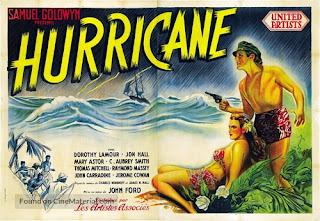
There are times when watching old movies can be… awkward, especially when the stories and themes of said film are in direct conflict with modern sensibilities. Usually, I try to take into account the time period in which a film was made, and while classics such as Tarzan the Ape Man, Disney’s Dumbo, and 1968’s The Party feature a number of racially-insensitive sequences, all of which would make today’s audiences cringe, these films have their strengths as well, so I recognize their shortcoming while also remembering they are a product of a less enlightened time.
And yet, I found it very difficult to get through John Ford’s The Hurricane. Set in the South Pacific during the height of European colonialism, The Hurricane had me rolling my eyes on more than one occasion, which definitely influenced my overall opinion of the movie.
Terangi (Jon Hall) is a native of the South Seas island of Manukura, a French colony. Having just returned home from a long voyage, Terangi is reunited with his fiancé Marama (Dorothy Lamour), and within hours the two are married by French priest Father Paul (C. Aubrey Smith).
Their honeymoon is short lived, however; Terangi and the rest of his crew are ordered by their skipper, Captain Nagle (Jerome Cowan), to sail for Tahiti the very next day. While there, Terangi gest into a fight with a French citizen and breaks his jaw. He is sentenced to six months in prison, but due to repeated escape attempts eventually finds himself facing a stint of 16 years!
Captain Nagle, Father Paul, and the colony’s physician Dr. Kersaint (Thomas Mitchell) try to convince DeLaage (Raymond Massey), the Governor of Manukura, to intercede on Terangi’s behalf and get his sentence suspended. DeLaage, who believes strongly in the letter of the law, refuses, and not even the pleas of his wife Madame DeLaage (Mary Astor) can sway him.
Terangi does eventually escape, resulting in a massive manhunt on both Tahiti and Manukura. Even the approach of a major storm, one strong enough to potentially destroy Manukura, won’t dissuade DeLaage, who is intent on recapturing Terangi and returning him to prison.
To their credit, John Ford and screenwriter Dudley Nichols went to great lengths to paint the natives of Manukura in a positive light while, at the same time, demonizing the French authorities; Terangi’s trouble began when a drunk Frenchman ordered him and several other Manukurans to leave a bar, simply because they weren’t white (Terangi refused, and punched the loudmouth across the jaw). Equally as loathsome is the sadistic guard played by John Carradine, who takes pleasure in making Terangi’s time in prison a living hell.
Alas, on more than one occasion, the people of Manukura are also depicted as childlike, and happy to submit to the rules of their French overseers. Even more problematic is the fact that the film’s most sympathetic native characters, Terangi and Marama, were played by Caucasian actors! It wasn’t until about 10 minutes into the movie that I even realized these two were supposed to be Islanders!
The Hurricane does feature a handful of strong performances, including Massey as the by-the-books Governor, Astor as his more sympathetic wife, and Mitchell as the oft-drunk doctor who admires the locals and does what he can to help them. Also, the final 20 minutes, when the titular hurricane finally strikes, are both tense and thrilling, and feature some nifty special effects.
Still, even with its strengths, The Hurricane is a movie that will likely rub 21st century viewers the wrong way. That’s the effect it had on me, anyway.
Rating: 5 out of 10
